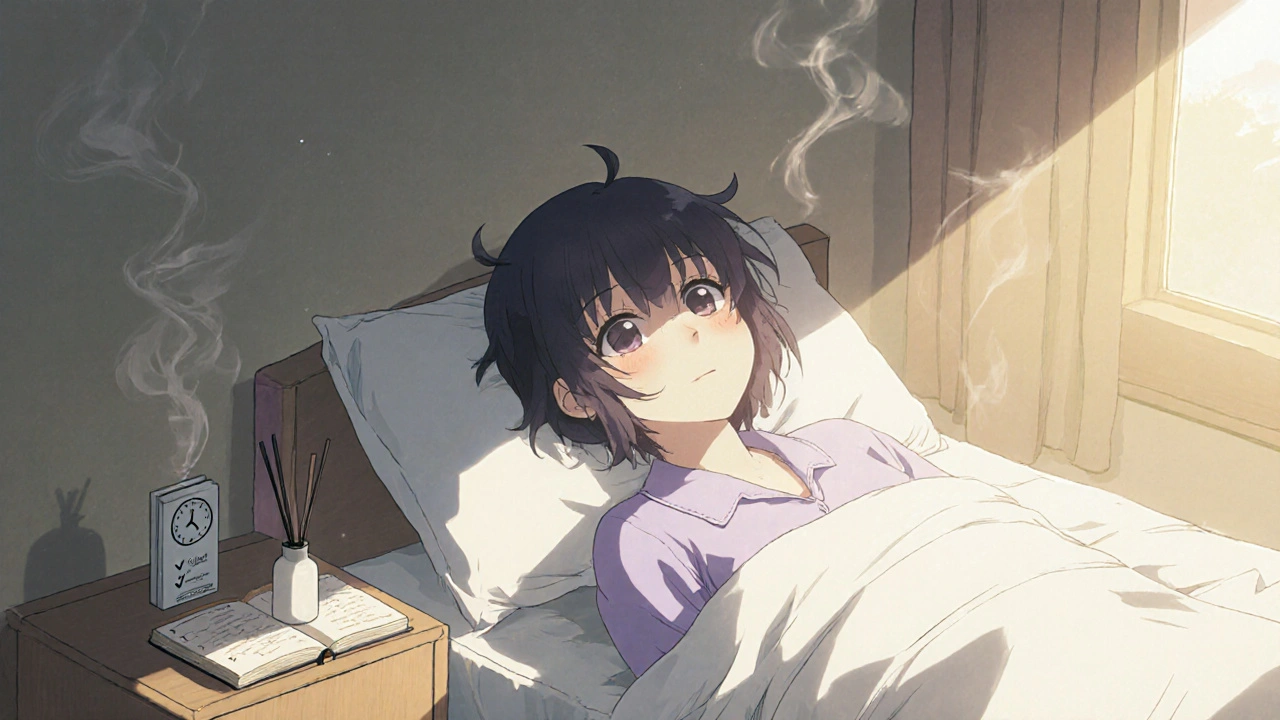Sleep Aid Selector
Find Your Best Natural Sleep Aid
Select your preferences to get personalized recommendations based on the article's natural alternatives to doxylamine.
Your Recommended Sleep Aid
Why this recommendation?
Important Considerations
Key Takeaways
- Natural options like melatonin, valerian root, and magnesium can replace doxylamine for many sleepers.
- Assess safety, dosage, and evidence before swapping any supplement.
- Combine supplements with good sleep hygiene for the strongest results.
Ever taken Doxylamine is an over‑the‑counter antihistamine that many rely on for occasional insomnia. While it works for a lot of people, it also brings next‑day grogginess, dry mouth, and a hang‑over feeling. If you’re chasing a smoother wake‑up, it’s worth looking at natural sleep aids that tackle the same problem without the unwanted side effects.
Why Look for a Natural Substitute?
Doxylamine blocks histamine receptors to calm the brain, but it does so indiscriminately-affecting other pathways that keep you alert during the day. Natural alternatives often target melatonin production, GABA activity, or muscle relaxation, offering a gentler wind‑down. They also tend to have a better safety profile for long‑term use, which matters if insomnia becomes a nightly habit.
Quick Comparison of the Most Popular Natural Sleep Aids
| Supplement | Typical Dose | Onset (minutes) | Main Side Effects | Evidence Strength |
|---|---|---|---|---|
| Melatonin | 0.5-5 mg nightly | 30‑60 | Mild vivid dreams, morning grogginess (high dose) | Strong (multiple RCTs) |
| Valerian Root | 400-900 mg 30 min before bed | 60‑120 | Headache, dizziness | Moderate (meta‑analyses mixed) |
| Chamomile (tea or extract) | 1‑2 tsp dried flowers (tea) or 250 mg extract | 15‑30 | Rare allergic reaction | Low‑to‑moderate (small trials) |
| Lavender Essential Oil (aromatherapy) | 2‑3 drops on pillow or diffuser | 5‑15 | Skin irritation (undiluted) | Low (pilot studies) |
| Magnesium (glycinate or citrate) | 200‑400 mg nightly | 30‑60 | Loose stools (high dose) | Moderate (clinical trials) |
| CBD (Cannabidiol) | 10‑25 mg sublingual | 15‑45 | Dry mouth, fatigue | Emerging (early RCTs) |
How Each Alternative Works
Melatonin mimics the hormone your brain releases when darkness sets in. It tells the body “time to sleep,” making it especially helpful for shift workers or jet‑lagged travelers.
Valerian root contains valerenic acids that amplify GABA, the calming neurotransmitter. The result is deeper, less fragmented sleep.
Chamomile is rich in apigenin, a flavonoid that binds to benzodiazepine receptors, producing a mild sedative effect without dependence.
Lavender essential oil works through the olfactory system; inhaling its scent lowers heart rate and cortisol, nudging the nervous system toward relaxation.
Magnesium is a co‑factor for over 300 enzymatic reactions, including those that regulate melatonin synthesis and muscle relaxation. Low magnesium levels often correlate with insomnia.
CBD interacts with the endocannabinoid system, reducing anxiety and pain-two major culprits that keep people awake.

Choosing the Right Alternative for You
Consider three factors before swapping doxylamine:
- Root cause of your sleeplessness - If anxiety is the main issue, CBD or lavender may help more than melatonin.
- Medical history - People on blood thinners should avoid high‑dose magnesium; those with liver disease need caution with valerian.
- Desired onset time - For quick fall‑asleep, lavender or chamomile tea can work within minutes, while melatonin may need an hour.
Start with the lowest recommended dose, track how you feel, and adjust gradually. A simple sleep diary (time you take the supplement, bedtime, wake‑time, next‑day alertness) can reveal what works best.
Integrating Supplements with Sleep Hygiene
Even the best natural aid can’t rescue a chaotic bedtime routine. Pair your chosen supplement with these habits for a full‑proof plan:
- Dim lights 60 minutes before bed; blue‑light filters on devices.
- Keep the bedroom cool (around 65 °F) and quiet.
- Limit caffeine after 2 p.m. and avoid heavy meals late night.
- Reserve the bed for sleep only-no scrolling or work.
- Wind down with a brief 5‑minute mindfulness or breathing exercise.
Potential Pitfalls and How to Avoid Them
Over‑dosing - More isn’t always better. High melatonin can cause vivid dreams and next‑day drowsiness. Stick to the lowest effective amount.
Interaction with meds - Valerian may boost the effect of sedatives, while magnesium can interfere with certain antibiotics. Always check with a pharmacist.
Quality variance - Supplements aren’t FDA‑approved for efficacy. Choose brands that provide third‑party testing (USP, NSF).

When Doxylamine Still Makes Sense
If you need an occasional “insurance” pill for a stressful night, doxylamine remains effective. Use it sparingly-no more than twice a week-to avoid tolerance and dependence. Combine it with a short course of a natural aid to wean yourself off over time.
Bottom Line
Switching from doxylamine to a natural sleep aid can give you a clearer mind in the morning, fewer side effects, and the freedom to use the supplement nightly if needed. Pick the option that matches your body’s chemistry, start low, track results, and keep good sleep hygiene in place.
Frequently Asked Questions
Can I take melatonin and doxylamine together?
Combining them can cause excess drowsiness and may interfere with your circadian rhythm. It’s safer to choose one or the other and give at least a 4‑hour gap if you need to switch.
Is valerian safe for long‑term use?
Research suggests valerian is low‑risk for most adults when used up to 12 weeks. Longer use should be discussed with a healthcare provider, especially if you’re on antidepressants.
How does magnesium improve sleep?
Magnesium helps relax muscles and supports the enzyme that converts tryptophan to melatonin, which can shorten the time it takes to fall asleep.
Will lavender oil make me sleepy all night?
A few drops on a pillow or in a diffuser promote relaxation, but they don’t produce a sedative effect that lasts the entire night. Pairing with a mild supplement can help.
Is CBD legal for sleep in the US?
CBD derived from hemp (≤0.3% THC) is federally legal, but state regulations vary. Always buy from a reputable source that provides a Certificate of Analysis.





Alex Lineses - 18 October 2025
When you’re transitioning from doxylamine to a botanical, think of it like swapping out a high‑affinity antagonist for a modulatory agonist-gradual titration is key. Start with the lowest effective melatonin dose (0.5 mg) and log the pharmacodynamic response in a sleep diary to capture latency and sleep architecture changes. If you need a GABAergic boost, valerian at 400 mg can be introduced once you’ve established baseline melatonin efficacy, but keep the half‑life interactions in mind. Magnesium glycinate at 200 mg before bed also supports the enzymatic conversion of tryptophan to serotonin, which synergizes with melatonin’s circadian signaling. Watch for cumulative antihistaminergic load; combining doxylamine with any sedative can push you past the therapeutic window and trigger next‑day residual effects. Remember, the goal is to maintain homeostatic sleep pressure without oversaturating receptor pathways, so adjust incrementally and reassess weekly.
Grace Hada - 1 November 2025
Stop babysitting the supplement label and just pick the one that actually moves you off the doxylamine hamster wheel.
alex montana - 22 November 2025
So i tried the lavender oil-spritzed it on my pillow-then i knocked out like a rock i guess? The smell was chill; but the next morning i felt kinda groggy... maybe the dose was too high? Anyway, the whole thing felt like a wellness trend with an extra kick of placebo.
Wyatt Schwindt - 6 December 2025
Lavender can help relax but it’s not a knockout drug.
Lyle Mills - 27 December 2025
Magnesium serves as a cofactor in the γ‑aminobutyric acid synthesis pathway, so supplementing 300 mg of glycinate before sleep can enhance inhibitory neurotransmission without the anticholinergic load of doxylamine. Pair it with a consistent wind‑down routine-dim lights, screen‑free zone-to reinforce the physiologic sleep drive. If you’re prone to nocturnal leg cramps, the mineral also aids muscle relaxation through calcium antagonism. Keep the intake under 400 mg to avoid osmotic diarrhea, and monitor serum levels if you’re on diuretics. This approach targets the mechanistic root of insomnia rather than just masking symptoms.
Barbara Grzegorzewska - 10 January 2026
Honestly, u think a tea‑leaf can out‑perform a legit pharm? In US we pride ourselves on biotech, not on some "hippie" brews that barely hit the radar. If you’re gonna ditch doxylamine, better grab a FDA‑cleared melatonin 5 mg capsule, not that cheap chamomile crap from a corner store. Our country’s health standards are leagues ahead-don’t sell yourself short.
Nis Hansen - 30 January 2026
When evaluating a shift from doxylamine to a natural sleep aid, it is essential to adopt a systematic, evidence‑based framework that respects both the neurobiology of sleep and individual lifestyle variables. First, identify the predominant drivers of your nocturnal arousal-whether they stem from circadian misalignment, hyperarousal, or musculoskeletal tension. Second, select a candidate supplement whose primary mechanism aligns with that driver; for example, melatonin for circadian phase shifts, valerian for GABAergic enhancement, and magnesium for neuromuscular relaxation. Third, establish a baseline by recording sleep latency, total sleep time, and subjective alertness over a minimum of five consecutive nights without any pharmacologic intervention. Fourth, introduce the chosen supplement at the lowest recommended dose and maintain a consistent administration window relative to your intended bedtime. Fifth, monitor outcomes daily, noting any adverse sensations such as vivid dreams, gastrointestinal upset, or next‑day somnolence, and adjust the dose accordingly. Sixth, evaluate the cumulative effect after two weeks; if improvements are modest, consider adjunctive strategies such as progressive muscle relaxation or controlled breathing exercises. Seventh, should the natural aid prove insufficient, contemplate a short, intermittent use of doxylamine not exceeding two nights per week, thereby avoiding tolerance buildup. Eighth, always cross‑check potential interactions with existing medications, especially anticoagulants, antihypertensives, or central nervous system depressants. Ninth, prioritize products that carry third‑party certification (USP, NSF) to mitigate variability in active ingredient potency. Tenth, remember that sleep hygiene-temperature regulation, light exposure control, and electronic device curfew-remains the cornerstone upon which any supplement will act. Eleventh, maintain a reflective journal to capture not only quantitative metrics but also qualitative shifts in mood, energy, and cognitive clarity. Twelfth, discuss your regimen periodically with a healthcare professional, particularly if you have underlying psychiatric or metabolic conditions. Thirteenth, stay informed about emerging research, as the evidence base for compounds like CBD continues to evolve. Fourteenth, be patient; natural adaptations often require several weeks to manifest fully, whereas synthetic antihistamines produce rapid, albeit transient, sedation. Finally, trust the iterative process, and celebrate incremental progress toward a restorative, unfragmented night’s sleep.
Fabian Märkl - 13 February 2026
That’s a solid roadmap, Nis - thanks for laying it out so clearly! 🌟 I’ll start logging my sleep and give melatonin a trial run this week. 😊